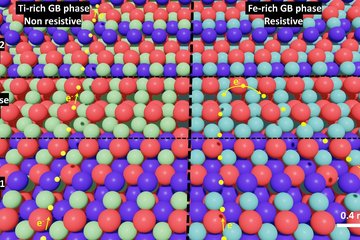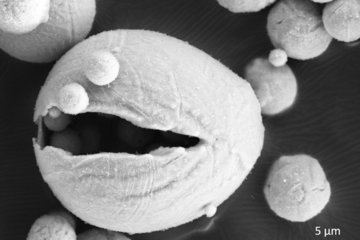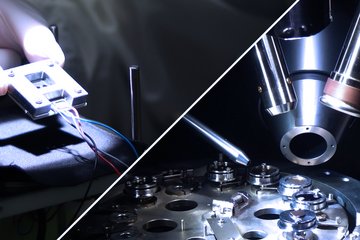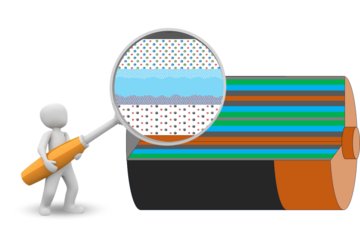All genres
861.
Poster
In situ investigation of the interlayer dominated failure of Cu thin films for flexible electronic devices. Gordon Research Conference “Thin Film and Small Scale Mechanical Behavior”, Bentley University, Waltham, Waltham, MA, USA (2014)
862.
Poster
Dislocation network formation in coherent twin boundary in Cu: Atomistic simulations. Schöntal symposium on dislocation-based plasticity, Bad Schöntal, Germany (2014)
863.
Poster
Nanotribology: Microplowing induced plasticity in austenite. Gordon Research Conference: Tribology, Waltham, MA, USA (2014)
864.
Poster
Microstructural characterization of cold-drawn pearlitic steel wires at the nanometer scale. The Thin Film & Small Scale Mechanical Behavior Gordon Research Conference, Waltham, MA, USA (2014)
865.
Poster
Nanotribology and Microstructure Evolution in Pearlite. 3rd European Symposium on Friction, Wear and Wear Protection, Karlsruhe, Germany (2014)
866.
Poster
Dislocation motion in bi-crystals with a specific grain boundary orientation studied by in situ SEM and in situ µLaue diffraction. Conference: Thin Film & Small Scale Mechanical Behavior Gordon Research , Waltham, MA, USA (2014)
867.
Poster
Dislocation motion in bi-crystals with a specific grain boundary orientation studied by in situ SEM and in situ µLaue diffraction. Seminar: Thin Film & Small Scale Mechanical Behavior Gordon Research , Waltham, MA, USA (2014)
868.
Poster
Improving lead-free solders by resolving mechanical properties at the microstructure length scale. Thin Film & Small Scale Mechanical Behavior 2014, Gordon Research Conference, Waltham, MA, USA (2014)
869.
Poster
Fracture behavior of gradient PtNiAl bond coats at the micron-scale using in-situ microbeam bend studies. 13th European Nanomechanical User Group Meeting, Oxford, UK (2013)
870.
Poster
Deformation behavior of thin Cu/Cr films on polyimide. Small Scale Plasticity School, Cargèse, Corsica, France (2013)
871.
Poster
Adhesion behavior of Cu–Cr thin films on polyimide substrate. ECI Conference "Nano- and Micro-Mechanical Testing in Materials Research and Development IV", Olhão, Portugal (2013)
872.
Poster
Nanotribology: Size-dependent friction coefficient and surface topology evolution. GDRi CNRS MECANO General Meeting on the Mechanics of Nano-Objects, MPIE, Düsseldorf, Germany (2013)
873.
Poster
Microstructural characterization of cold-drawn pearlitic steel wires. GDRi CNRS MECANO General Meeting on the Mechanics of Nano-Objects, MPI, Düsseldorf, Germany (2013)
874.
Poster
Micromechanical investigation of solder joints in automotive microelectronics. GDRi CNRS MECANO General Meeting on the Mechanics of Nano-Objects, MPIE, Düsseldorf, Germany (2013)
875.
Poster
Adhesion Behavior of Cu–Cr Thin Films on Polyimide Substrate. TMS 2013: 142nd Annual Meeting & Exhibition, San Antonio, TX, USA (2013)
876.
Poster
Micromechanical investigation of solder joints for automotive microelectronics. Nano- and Micromechanical Testing in Materials Research and Development IV, Olhão Algarve, Portugal (2013)
877.
Poster
Micromechanical investigation of lead-free solder joints in microelectronics. Small Scale Plasticity School, Cargèse, Korsika, France (2013)
878.
Poster
Microstructural studies of Cu–Cr thin film structures grown by molecular beam epitaxy using advanced transmission electron microscopy. Macan Theromodynamics Workshop, Istanbul, Turkey (2012)
879.
Poster
Thermo-mechanical investigation of lead-free solder. GDRi MECANO General Meeting 2012, Ecole de Mines, Paris, France (2012)
880.
Poster
In-situ fracture study of thin Cu films on polyimide substrate. GDRi MECANO General Meeting 2012, Ecole de Mines, Paris, France (2012)










